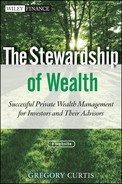What Should Edith Do?
John Bogle has an answer to Edith's dilemma, and it will surprise no one who knows him: index funds.27 Perhaps we can be forgiven for suspecting that Mr. Bogle would also view index funds as the cure for world hunger, the solution to the Arab-Israeli conflict, and a handy way to deal with killer asteroids. But in this case he's onto something. If Edith had used index funds instead of Mildew Trust Co., she would have reduced both her investment costs (index fund fees are very low and, given their relatively low turnover, generate lower frictional investment costs than do active managers) and her taxes as well (lower turnover translates into lower taxes).
Although we don't subscribe to Bogle's claim that the use of index funds will “reduce both investment costs and taxes almost to the vanishing point,”28 if Edith could cut her cost- and tax-drag in half she would at least move her long-term rate of return back into positive territory. Adding 2 percent back to her bottom line annual return would bring her overall return to 1.1 percent and would allow Edith to grow her principal modestly and leave her grandchildren slightly more money than her grandmother left her.
But that's if everything else goes right, including Edith's ability to achieve an 11.3 percent annual compound return over 50 years. A far more likely outcome, we fear, is the one we reached a few paragraphs ago: Edith's $10 million inheritance will gradually diminish in value, not grow.
One reason we don't share Mr. Bogle's unlimited enthusiasm for index funds is that he was speaking about a retail investor—instead of starting with $10 million for purposes of his calculations, he started with $1,000—whereas we are speaking about families with a significant degree of affluence. Such families are almost always in far higher (and more complex) tax brackets than retail investors, and hence even the normal turnover and costs associated with the use of index funds will be problematic. Moreover, a U.S. large-capitalization index fund is hardly a clever portfolio strategy, nor one Edith—or any other investor—should adopt or stick with through thick and thin.
The point of all this is obvious: Investing capital successfully is a gigantic challenge. In fact, for families with significant capital, the stewardship of that wealth is almost certainly going to be the biggest challenge they will ever face. There may be more important challenges—raising happy and productive children, finding the right mate and making that relationship work—but we are largely programmed to undertake those challenges. Our everyday experience virtually from birth prepares us for those duties.
But almost no one is prepared to invest capital successfully. Our everyday experience is not only not on point, but is all-too-often positively counterproductive—because much about successful investing is counterintuitive.29 Consider what Edith would have to do—and do it all right!—in order to grow her inheritance over a 50-year period:
- Edith would have to pay close attention to the problem of variance drain, by developing a sophisticated portfolio strategy that maximizes her investment returns while minimizing her risk (that is, the volatility of those returns). See the discussion earlier in this chapter.
- Because inflation is the insidious cancer of the investment world, quietly but effectively destroying wealth over time, Edith must anticipate this issue in her portfolio. She could permanently add assets to her portfolio that tend to perform well during periods of unexpected inflation—real estate, commodities, inflation-protected bonds—but the problem with this tactic is that it will tend to bring down her long-term rate of return. See Chapter 13.
- Like inflation, tax rates come and go, but like death, they will always be with us. Edith will need to adopt tax-efficient strategies throughout her investment portfolio, including:
- Designing her asset allocation strategy using estimated after-tax (not pretax) returns, and adjusting expected correlations and volatilities as appropriate. Otherwise, she will not be deploying her assets efficiently. See Chapter 9.
- Paying close attention to asset location issues. Putting the right investments in the wrong pockets can seriously compromise Edith's returns. See Chapter 19.
- Developing tax-aware strategies in each asset class. A strategy that works in U.S. large cap, for example, will likely be suboptimal elsewhere in the portfolio. See Chapter 18.
- Working with investment managers who exhibit proper awareness of the trade-offs between alpha generation and tax consequences. The production of alpha generally implies taking investment actions that will cause tax consequences for the investor. If the anticipated alpha isn't great enough to compensate the investor for the tax cost, the actions shouldn't be taken. See Chapter 18.
- Aggressively harvesting tax losses throughout the year and across all managed accounts. See Chapter 18.
- Edith will need to optimize (not minimize) her investment costs, primarily by (a) being aware of the damage such costs can cause to her portfolio, (b) allocating investment fees to asset classes and managers who actually have a chance to add value (and away from asset classes and managers who have little chance to do so), and (c) keeping portfolio turnover to a minimum. See Chapter 18.
- If Edith is anything like the rest of us, her postinheritance lifestyle will be considerably more opulent than her preinheritance lifestyle. But although $10 million (or $100 million, or $1 billion) seems like a lot of money, there is no amount of money that profligate spending can't decimate over time. If Edith can keep her spending closer to 3 percent of her principal than 4 percent, she will have a far better chance to maintain and grow her wealth. See Chapter 21.
- Finally, despite the many provocations Edith is likely to face over the course of half a century, she will need to stick to her long-term investment strategy with almost superhuman endurance.
